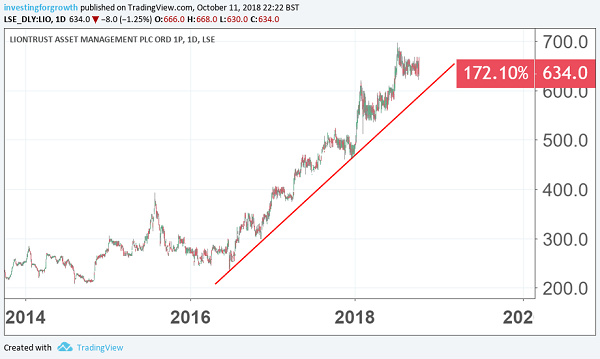Stockwatch: A turning point for this share?
12th October 2018 09:43
by Edmond Jackson from interactive investor
Growth has been rapid in recent years, but interest rates are on the rise. Companies analyst Edmond Jackson wonders whether this is an early-stage wake-up call, or if concerns are overdone.

Growth has been rapid in recent years, but interest rates are on the rise. Companies analyst Edmond Jackson wonders whether this is an early-stage wake-up call, or if concerns are overdone.
Should you ignore the "noise" of current market turmoil, and trust resilient company updates, or treat it as a justified upset - marking a sea-change towards financial assets, many of which got over-inflated?
On a macro reading, key issues are: a frothy US economy – the result of hefty tax cuts and spending hikes, late in the economic cycle – creating resolve in the Federal Reserve to raise interest rates and contain inflation. This coincides with a trade stand-off between China and the US that's liable to undermine growth internationally. Bond yields are generally rising and risk-aversion is slashing growth stocks previously loved amid exceptionally low interest rates.
On a micro reading, even so, Liontrust Asset Management, a circa £330 million FTSE SmallCap fund manager, has just declared continued strong progress for the six months to end-September with assets up 15% to £12 billion over this period. Net inflows have accelerated, up 26% to £403 million in the three months to end-September, it is possible to decipher from the latest update. This affirms articles I have written suggesting Liontrust as a momentum stock, remarking also how fund management companies benefit from operational gearing – while the going is good.
Is bond investment a sufficiently robust hedge?
Another key point from this update is that "flows into Liontrust funds coming from a broader spread of clients and into an expanding number of strategies". That's good if the markets' roiling proves temporary, wiping away excess.
The dilemma – we can't know as yet – is whether it's a tremor ahead of a more substantial shift in financial plate tectonics. Not to get dramatic about a market crash coming, but a decade of exceptional monetary stimulus is altering, the US leading the way (as it does) to net tightening. Central banks' actions since the 2008 crisis have driven substantial demand for financial assets, within which there’s currently a sense that bond funds represent useful diversification.
"There has been strong client demand over the past five months for the launch of funds managed by the Global Fixed Income team... nearly £300 million now managed across the strategic bond, high-yield bond and absolute return bond, strategies."
Personally, I am wary of bond funds as a solution to current risks, especially for enterprising investors broadly oriented to equities in the long run. Yes, capable bond portfolio managers can trade adeptly now markets are turning more volatile and yields rising; but given the inverse relationship between bond yields and prices anyway, in a rising interest rate environment I'm not convinced they make overall sense.
• Stockwatch: A momentum play in asset management
• A financial share at a tipping point
I read one report (not by Liontrust) effectively about treating bond funds as a proxy for cash, where you can get better income than zilch from cash-on-deposit. But given managers' remuneration is typically exacted via a buy/sell spread on any investment fund, you should treat it as a medium-term commitment at least.
An element of demand for bonds may grow, e.g. as IFA's exhort clients to own a spread of assets in response to equity market jitters, so Liontrust's £300 million under management in bond funds should grow. It remains unclear whether investors will successfully mitigate risk, given a key lesson of the 2008 crisis was all assets plunging in value, and yields could be rising because bonds are in a bear market. Certainly, you'd be diversifying assets but I'm not convinced that means risk, and it's wise to have flexibility to buy into a markets' slump, should it happen.
Like I wrote on AIM-listed Miton Group fund managers a week ago, Liontrust implicitly respects the primacy of equities, being thus orientated. Fund performance varies, e.g. with 10 of Liontrust's 21 funds in their sector's No 1 quartile ranking since launch or manager appointed, albeit 4 in No 4.
It isn't necessarily a guide to future prospects, as a sea-change in financial conditions can reverse the success or otherwise, of a particular style. Yet a fund's mandate will need to stay reasonably consistent to meet investors' objective than chop-and-change.
| Liontrust Asset Management - financial summary | Consensus estimates | ||||||
|---|---|---|---|---|---|---|---|
| year ended 31 Mar | 2014 | 2015 | 2016 | 2017 | 2018 | 2019 | 2020 |
| Turnover (£ million) | 28.5 | 36.8 | 45.0 | 51.5 | 76.9 | ||
| IFRS3 pre-tax profit (£m) | 3.2 | 7.3 | 9.4 | 9.1 | 12.3 | ||
| Normalised pre-tax profit (£m) | 3.7 | 7.3 | 9.5 | 9.3 | 12.5 | 19.2 | 20.3 |
| Operating margin (%) | 13.1 | 19.8 | 21.1 | 17.8 | 16.1 | ||
| IFRS3 earnings/share (p) | 4.6 | 13.6 | 16.1 | 14.8 | 14.8 | ||
| Normalised earnings/share (p) | 5.8 | 13.6 | 16.3 | 15.3 | 26.2 | 44.8 | 48.7 |
| Price/earnings multiple (x) | 24.8 | 14.5 | 13.3 | ||||
| Annual average historic P/E (x) | 46.8 | 28.5 | 18.6 | 28.3 | 26.6 | ||
| Cash flow/share (p) | 18.7 | 10.2 | 17.8 | 24.2 | 47.3 | ||
| Capex/share (p) | 0.4 | 0.2 | 0.2 | 9.2 | 0.4 | ||
| Dividend per share (p) | 2.0 | 4.0 | 9.0 | 13.0 | 16.0 | 23.8 | 26.5 |
| Yield (%) | 2.5 | 3.7 | 4.3 | ||||
| Covered by earnings (x) | 3.6 | 3.6 | 1.9 | 1.2 | 2.3 | 1.9 | 1.8 |
| Net tangible assets per share (p) | 30.0 | 41.2 | 52.0 | 50.4 | 46.4 | ||
Source: Company REFS Past performance is not a guide to future performance
Prosperity broadly reflects a decade of stimulus
My chief point is asset managers' strong growth like Miton and Liontrust have evidenced in recent years, resulting from keen demand for financial assets, especially equities. Not to say they can't prosper otherwise, though I question if such growth rates are sustainable if the Fed means what it says about higher interest rates. Investors who've flocked into financial assets may be at an early-stage wake-up call, about how prices can go down as well as up.
Consensus among asset managers is that the global economic backbone is strong, the US is not heading for recession, and no way is it "game over" for financial assets. Time will tell whether this perspective is sufficiently objective to identify any turning point, when it derives from those benefiting most from a 10-year-old party.
Page 5 of a recent Liontrust shareholder circular on remuneration policy makes a link between pay and performance, as if the chief executive's remuneration relates to returns delivered to shareholders and assets under management. Obviously, a capable boss can help, but I feel the principal driver for value creation in fund management has been keen public demand for funds - meeting the attractive economics of the smaller operators especially, where revenue growth drops swiftly into profits..
I therefore adjust my stance on Liontrust similarly as Miton a week ago, broadly to "take profits". There's scope for variance like retaining an extent of holding if you have already de-risked your portfolio into cash to some extent, and are not significantly exposed to the financial sector.
I could be over-reacting to wider market falls. In response to its 11 October update, Liontrust shares were initially marked up from 642p to near 670p as the market took inspiration, yet the balance of a day's trading trimmed that. You could also say I have my own agenda as a commentator to preserve a good and regular, long-term buy/add idea from 110p in October 2012, lest markets slide further. Yet it mainly concerns me, growth rates as currently being reported for assets under management, aren't sustainable, hence earnings growth will temper.

Source: TradingView Past performance is not a guide to future performance
Valuation emphasis is on earnings, potentially mercurial
In fairness, and from the table, the 2020 consensus of two brokers is already cautious – looking for single-figure earnings growth – although the mercurial nature of this industry's profits is shown by a recent hike in expectations for the current year to March 2019, from £14.7 million (according to my records) to £19.2 million.
It's possible such a re-rating is durable in the sense of annual management fees on funds, though revenues derive also from initial charges, commissions and performance fees. After a long period of supportive financial markets, fund managers' revenues could now be tested.
With the stock currently around 650p its forward price/earnings (PE) is in the low teens, assuming the 2020 year projection is fair. That's hardly extended like many other growth stocks, and private investors may ride out volatility in funds they’ve bought, rather than cash out.
A 'sell' stance could be overdoing it, though mind the valuation focus is primarily earnings, given the chief assets are people, and dividend prospects would require a price drop near 500p to exact say a 5% yield as a prop. In a context of rising risks for asset managers to gather/retain cash and perform with it: Take profits.
Edmond Jackson is a freelance contributor and not a direct employee of interactive investor.
These articles are provided for information purposes only. Occasionally, an opinion about whether to buy or sell a specific investment may be provided by third parties. The content is not intended to be a personal recommendation to buy or sell any financial instrument or product, or to adopt any investment strategy as it is not provided based on an assessment of your investing knowledge and experience, your financial situation or your investment objectives. The value of your investments, and the income derived from them, may go down as well as up. You may not get back all the money that you invest. The investments referred to in this article may not be suitable for all investors, and if in doubt, an investor should seek advice from a qualified investment adviser.
Full performance can be found on the company or index summary page on the interactive investor website. Simply click on the company's or index name highlighted in the article.
Disclosure
We use a combination of fundamental and technical analysis in forming our view as to the valuation and prospects of an investment. Where relevant we have set out those particular matters we think are important in the above article, but further detail can be found here.
Please note that our article on this investment should not be considered to be a regular publication.
Details of all recommendations issued by ii during the previous 12-month period can be found here.
ii adheres to a strict code of conduct. Contributors may hold shares or have other interests in companies included in these portfolios, which could create a conflict of interests. Contributors intending to write about any financial instruments in which they have an interest are required to disclose such interest to ii and in the article itself. ii will at all times consider whether such interest impairs the objectivity of the recommendation.
In addition, individuals involved in the production of investment articles are subject to a personal account dealing restriction, which prevents them from placing a transaction in the specified instrument(s) for a period before and for five working days after such publication. This is to avoid personal interests conflicting with the interests of the recipients of those investment articles.